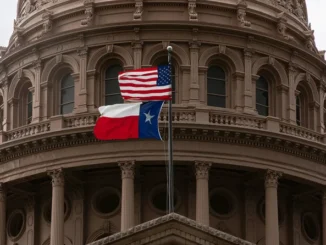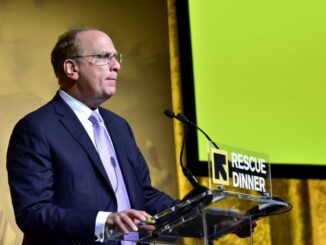
It’s a “deadly distraction” to think major corporations can replace sweeping government action in response to the climate crisis, according to a former finance professional who now says he helped promote that “fantasy” as chief investment officer for sustainable investing at mammoth investment firm BlackRock Inc.
“As COVID-19 landed in Canada last year, we quickly learned the importance of having an effective government take charge when a systemic crisis hits,” writes Tariq Fancy, now the founder of Rumie, a Toronto-based education technology non-profit, in a guest post for the Globe and Mail. “The crisis was also a sharp reminder of what science and policy experts have told us for decades: that similar government action is desperately needed to avert the far more dangerous threat posed by climate change.”
But “that action is still being held up by the illusion promoted by many global business leaders that the free market will somehow correct itself and the climate crisis without government action,” he adds. “I know, because I helped contribute to this fantasy.”
Fancy recalls that “I thought I was doing something to help solve the climate problem by joining BlackRock Inc. in late 2017. The world’s largest investment firm had approached me to become its first chief investment officer (CIO) for sustainable investing,” a position that would give him a say in managing nearly US$9 trillion in assets.
When Fancy was in his second week on the job, BlackRock CEO Larry Fink issued his now-famous letter urging companies to embrace a “social purpose” and recognize that better performance on environmental, social and governance (ESG) issues would boost their long-term profits. “Society increasingly is turning to the private sector and asking that companies respond to broader societal challenges,” Fink wrote.
In the January, 2020 edition of his annual missive, the BlackRock CEO followed up with an emphasis on climate risk and fossil fuel divestment.
But BlackRock’s actual performance has left it open to charges of greenwashing and demands that it pick up the pace on divestment. And Fancy got an in-house perspective on the problems campaigners are identifying.
“My responsibilities at BlackRock included incorporating ESG into the investment processes that govern the world’s largest pool of investment assets,” he writes. “But I quickly learned that ESG isn’t as useful to investing as I had hoped. Acting responsibly is not as profitable as advertised. Moreover, going through the investment process is a bizarre place to try to create social impact in the first place. Investment professionals are like competitive athletes: They’re trained to chase yield and profits,” and “legally obligated—as well as financially incentivized—to focus on dollar values, not social ones.”
Without effective government regulation, he adds, “that often means pursuing activities that harm society over the long term.”
Ideally, companies should be “responsible to all stakeholders—investors, employees, regulators, and more,” Fancy says. But they’re still “profit-seeking machines” at their core, with such short-term incentives that they won’t focus on the broader public interest in the face of “lax or no regulation in areas of critical importance” like climate change.
“In that context, waiting for the market to figure itself out is absurd,” he writes. “It’s like leaving bars open during a pandemic and hoping people will be responsible. It won’t work— it will spread infection, cost lives, prolong the pandemic, and force bar owners to wait even longer before they can safely reopen. Yet the speed, decisiveness, and extraordinary tools governments used quickly to bend down the COVID-19 infections curve are nowhere to be found in dealing with the climate crisis.”
Fancy makes the case for government intervention to get a different and better result, and explains how he concluded that the “nice and well-marketed idea” of sustainable investing is doing more harm than good. He calls on business leaders to take a stand for government intervention on a problem the private sector can’t solve.
“If you believe in capitalism, then you know that market failures cannot be addressed with silly markets-self-correct theories,” he writes. “Canadian business executives must find the moral clarity to make clear to the public that systemic problems require systemic solutions led by democratically-elected leaders. Truly averting the climate threat requires governments and the private sector to come together to rapidly transform our economy into one that doesn’t have to be bad for business, but can no longer be business as usual.”



